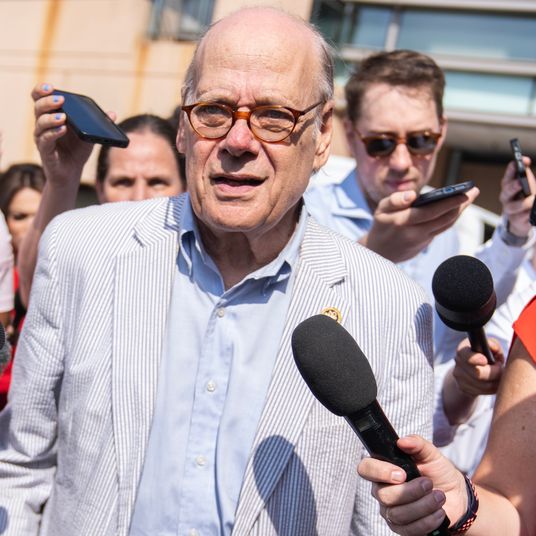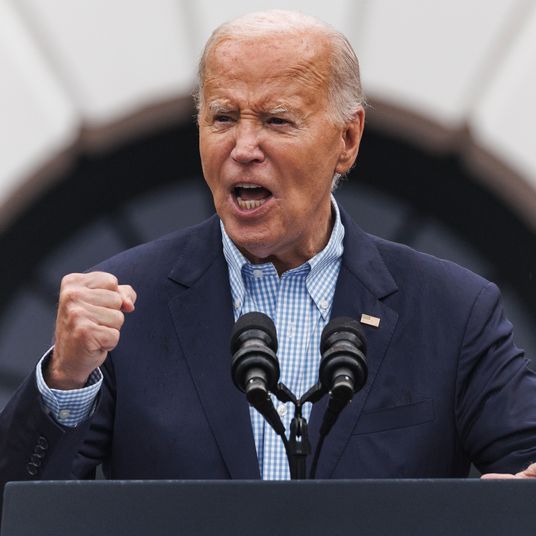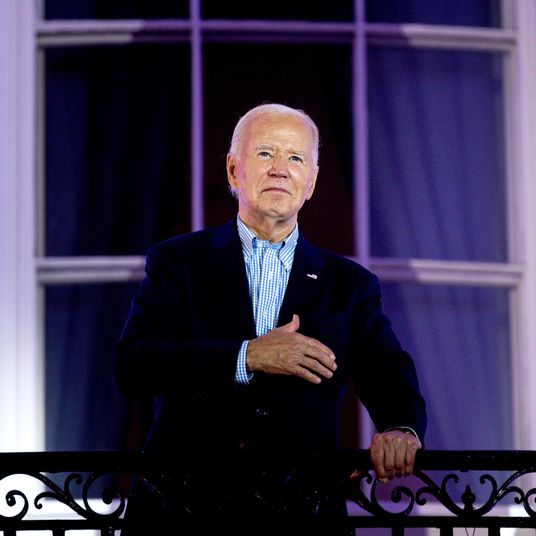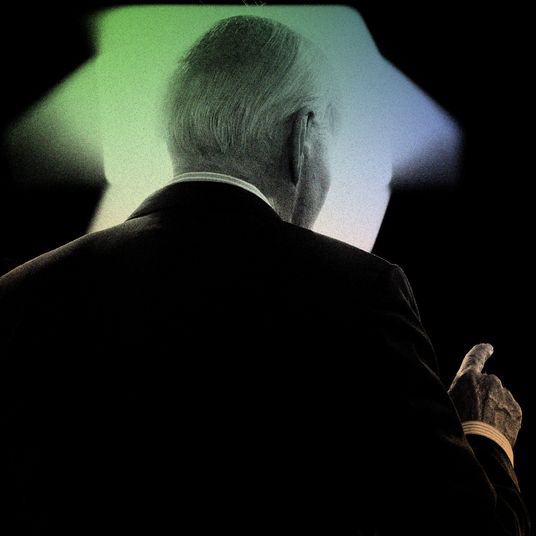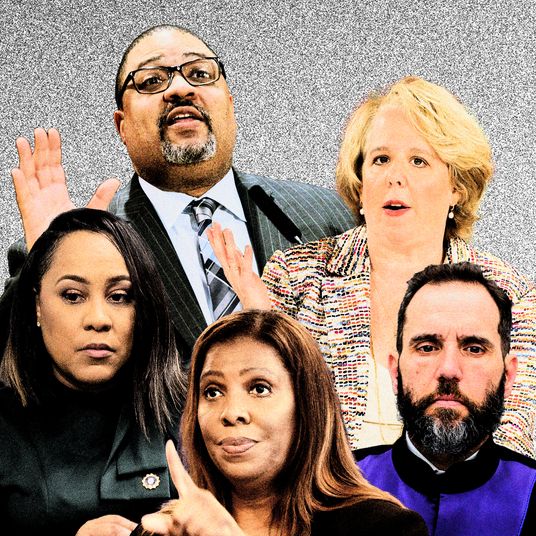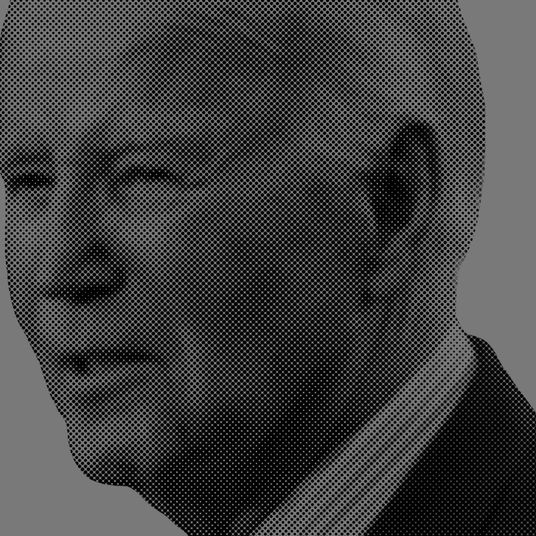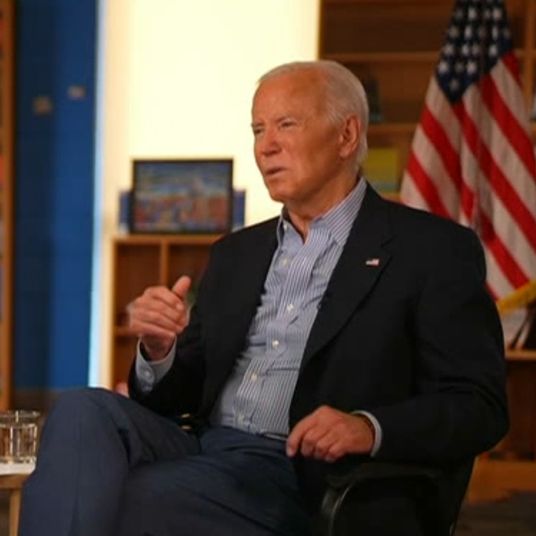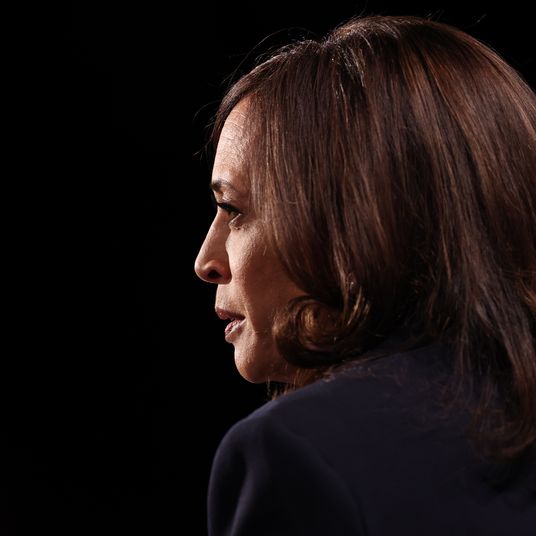
In June 2018, a rare opportunity arose for Hakeem Jeffries. A bartender named Alexandria Ocasio-Cortez ousted then–Democratic Caucus chair Joe Crowley in a stunning primary upset in New York’s 18th Congressional District. Crowley’s old job was suddenly up for grabs, and Jeffries, then an ambitious 48-year-old representative from Brooklyn, started angling for the chairmanship. Jeffries’s main competition was Barbara Lee, his fellow Congressional Black Caucus member and one of the chamber’s staunchest progressives. Lee had seniority — she was 72 and had been in Congress for 15 years longer than Jeffries — but moderate Democrats were getting skittish about Ocasio-Cortez. According to Politico, a pro-Jeffries whisper campaign started calling attention to the fact that Lee had donated to her. Jeffries beat Lee by ten votes.
The result was hailed as the dawn of a new generation of Democratic leadership, and four years later, Jeffries has fulfilled that promise, after Nancy Pelosi announced Thursday she was stepping down as leader of the House Democrats, since she is expected to hand the reins to him. If Jeffries wins election November 30, he will, at age 52, be the first Black leader of either party in the House or Senate — a remarkable feat for someone who’s been in Congress for less than a decade.
His coronation is part of the Democrats’ effort to make the party’s leadership class younger and Blacker. Jeffries looks the part of a next-generation changemaker down to his campaign-trail tracksuits and Notorious B.I.G. quotes. But for the Democratic Establishment, his ascent has achieved something more urgent than passing the torch: keeping the party’s left flank at bay.
In recent weeks, party moderates have felt vindicated. Establishment Democrats took a lot of flak in 2016 for being out of touch when Hillary Clinton lost the presidency to Donald Trump. They responded by engineering a “blue tsunami” in the 2018 midterms, highlighted by a net gain of 40 House seats. Joe Biden won the Democratic primary and then the White House in 2020, and moderate Senate Democrats picked up key swing seats in Arizona and Georgia, completing a governing trifecta that ushered in historic legislation on climate change and infrastructure. High inflation and Biden’s unpopularity seemed to portend a wipeout this November. Instead, Democrats defied the odds, retaining control of the Senate and keeping their House losses to a minimum — not enough for a majority but still the best midterm performance by an incumbent president’s party since 2002.
Jeffries has been personally affirmed too. “The extreme left is obsessed with talking trash about mainstream Democrats on Twitter, when the majority of the electorate constitute mainstream Democrats at the polls,” he told the New York Times in 2021. “The majority of Democratic voters recognize that Trumpism and the radical right is the real enemy, not us. Apparently the extreme left hasn’t figured that out.”
But other midterm trends tell a more complicated story. The New York Democratic machine that Jeffries helps lead cost Democrats the House in a year when it proved surprisingly winnable. Much of the blame lies with Andrew Cuomo, who packed the State Supreme Court with conservative justices. The redistricting they imposed ensured that at least five seats went to Republicans that should have gone to Democrats. One belonged to Sean Patrick Maloney, who chairs the Democratic Congressional Campaign Committee and had to bigfoot his way into a new district in the aftermath of the court’s decision. Jeffries and Pelosi are pushing the narrative that Maloney sacrificed himself to boost Democrats elsewhere. But according to Slate, quoting several Democratic grassroots groups, he ran a mediocre campaign and never became familiar with his new constituents.
Jeffries’s decision to launder the New York Democrats’ failure puts him at further odds with Ocasio-Cortez. Dating back to 2018, Justice Democrats, the leftist electoral group that recruited her, has viewed him as a target to get primaried. “Spread love, it’s the Brooklyn way,” the congressman replied when Politico asked him about their rationale — that he relies on corporate donors and is chummy with pro-charter-school interests. Now he’s defending Maloney and declining to censure state party chair Jay Jacobs, whose resignation Ocasio-Cortez has demanded for the New York Democratic Party’s poor midterms performance, which also saw Governor Kathy Hochul in a tighter-than-expected reelection race.
The Crown Heights native told The New Republic’s How to Save a Country podcast that he got interested in public service because of the 1992 L.A. riots. “I remember saying to myself, You know, we’ve come a long way as a country. We still have a long way to go,” he said. “But I do want to go off to law school, get involved in trying to use my law degree to fight for the principles of equal protection under the law — liberty and justice for all — in the purest possible way.” He acted on that desire by becoming a litigation associate for Paul, Weiss, Rifkind, Wharton & Garrison, one of the most profitable law firms in the world, and then a “highly paid litigator” for CBS, fighting lawsuits against the media giant. He “was one of our best litigation associates,” said Ted Wells, co-chairman of the litigation department at Jeffries’s old firm, in 2007. “He was a star and continues to be a star.”
His corporate-centrist inclinations are consistent with the evolving role of the Congressional Black Caucus. Once viewed as a thorn in the side of party leaders because of its agitation on behalf of everyday Black people, the self-styled “conscience of Congress” has gotten much bigger and more influential in its 51 years. Now the CBC resembles more of a professional organization for protecting incumbents and advancing the careers of its members. Its strong ties with sketchy corporate partners — including Walmart and Altria (formerly Philip Morris) — illustrate how far it has traveled from the margins of influence to the center. The shift has also made the organization flexible with its stated principles. It purports to withhold endorsements in races for open seats in which two Black candidates are running, but it gladly threw its weight behind moderate Shontel Brown when she faced leftist Nina Turner in their Ohio primary this year. In 2020, after white incumbent Eliot Engel said he “wouldn’t care” about a Bronx anti-police-abuse event if he “didn’t have a primary,” Jeffries supported him against Black challenger Jamaal Bowman.
Jeffries is a closer contemporary to Bowman, Ocasio-Cortez, and Cori Bush than to Pelosi, James Clyburn, and other members of the party’s gerontocratic leadership. Yet perhaps his defining in-caucus alliance is with Josh Gottheimer of New Jersey, one of the most conservative Democratic congressmen, who has threatened to blow up Biden’s agenda to defend tax breaks for the wealthy. Together with Alabama’s Terri Sewell, they formed the Team Blue PAC last year to protect incumbents against primaries from their left — which doubles as a warning shot to newly elected leftists such as Summer Lee and Maxwell Frost.
All of which calls into question what making the Democratic Party leadership class younger and Blacker actually means. If the biggest changes to Democratic policy and governance of the past several years have been the leftward shift driven by younger and less white officials, then the Brooklyn congressman has not been a meaningful part of it. On the contrary, he has often been an impediment. His reward has been a rapid ascent up the party’s ranks secured by endearing himself to its elders and siding with longtime incumbents and party leaders even as they’ve grown out of touch with their constituents. Much will be made of the historic nature of his promotion and the change it appears to signify. But for the party Establishment, the benefit of this generational change appears to be stasis.






